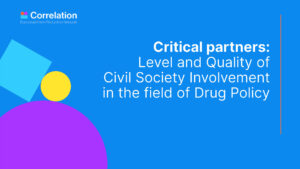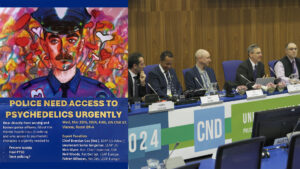The overdose epidemic in Scotland attracted international media attention but we know less about what is the situation in other parts of the UK. We interviewed Martin Balekbrough, the CEO of the Kaleidoscope Project from Wales.
Drugreporter: Can you please tell us about your organisation, the Kaleidoscope Project? What is your story and mission?
Martin Blakebrough: At Kaleidoscope we provide life-enhancing services to people in their communities. We support those with drug and alcohol problems, and tackle the stigma that surrounds them. We directly campaign for improved government policies that support instead of punish service users, and act as an advocate for individuals.
Kaleidoscope is one of the oldest drug services in the UK, established in 1968. In 2003 it moved its headquarters to Newport, South Wales and is today regarded as a Welsh Drug and Alcohol agency that provides services in every region of Wales. The move to Wales led to a break from the local church in Kingston and established Kaleidoscope as a standalone charity, after Newport local authority and the local health board approached us about establishing a rapid prescribing service in the area, and put an end to the incredibly long waiting lists people in need of help were confronted with. In some cases, the wait amounted to 4 years. We were able to help with the support of the Welsh Government, who allowed us the freedom to establish a service of our own design. This fresh approach and support gave me the sense that this was a new chapter for Kaleidoscope, and moving our HQ to Wales was in some way repaying the faith in us.
Reducing harm has long been the crux of Kaleidoscope’s mission. Founded in 1968 by my father Rev Eric Blakebrough, we started out as a nightclub, opening from 10pm until 6am. The aim of the club was to provide a safe place for young people on a Friday night, offering vegetarian food, live music, and basic medical services. The name ‘Kaleidoscope’ came from the diversity of people coming to the club – mods, rockers, teddy boys, hippies, and Hells Angels (Road Rats) – everyone was welcome.
Our services evolved alongside the needs of the young people. In the late 1960s, sex and drugs were en vogue and the challenge was how best to protect people. We organised a clinic for those visiting the club, where both advice and treatment were provided without judgement.
Our services grew in popularity, and by 1975 a new building had been designed. Two years later the new red brick church, hostel and club were opened. As a drug service, Kaleidoscope was maverick in making harm reduction the guiding principle of its work. In 1986, we introduced the UK’s first needle and syringe exchange, and developed the first computerised methadone dispensing service, allowing users to stabilise their drug use more safely. The success of our drug services was because of the fundamental belief in rapid prescribing.
Throughout the nineties Kaleidoscope continued to develop its services although it could only do so in Kingston because of its connection to the local Baptist Church. It did however provide training to many other UK providers and also supported projects globally with funding through the European Commission. Our work in India and Nepal was particularly significant – working with local NGOs we established the first needle and syringe exchange in Calcutta, and a methadone dispensing service in Kathmandu. Kaleidoscope still has close links with its Indian partners in particular.
North America has been suffering from a drug overdose epidemic which has become a major health emergency. It seems the overdose situation is getting worse and worse in Scotland as well. What about Wales – do you see the same trends there?
In England and Wales, while the epidemic may not be as alarming as in Scotland, the number of drug deaths are now at their highest level ever recorded – increasing by 84% over the last decade. In Wales we have some of the worst affected areas in the UK for drug deaths, and the picture here is more distressing when we consider that, unlike in England, drug treatment budgets have remained largely the same.
Swansea, Wales’ second city, has the worst opioid death rate in England & Wales – and the most acute drug misuse problems arise in coastal areas such as Blackpool, Teesside, and Swansea. This trend is influenced by socioeconomic factors, as prescription rates of opioid-based medication are significantly higher in low income areas.
Wales’ approach has moved toward harm reduction. This is positive, and in many ways reflects the realisation that this approach is necessary to combat the increase of drug related deaths. Of course there is still investment in recovery orientated activities, such as innovative out-of-work services, where people are given support to access volunteering, training, education, and employment opportunities. The Welsh Government has also championed Naloxone which has been successfully promoted.
The challenge in Wales however, is providing rapid access to basic substitution treatment. This problem is regional, and while in some areas it works quite well, in other areas access is poor and agencies have put conditions on people accessing the service. The lack of rapid prescribing in many cases is evidenced by the need for the police to commission their own rapid prescribing services – this has been necessary in South and North Wales Police areas.
In Wales therefore, the reason for record drug deaths may be different to England. I am however optimistic that given the Welsh Government’s engagement on the issue the solution to drug deaths may be quicker to find. In May this year Kaleidoscope will collaborate with substance misuse service provider Barod and the University of South Wales to hold a summit on reducing drug related deaths in Swansea. This is also supported by Welsh Government.
Many people criticise the government in the UK for missing the opportunity to respond to the epidemic by scaling up access to harm reduction programs. How do you see the role of the Welsh Government, is it more open to progressive solutions?
Harm reduction is a public health issue, and public health is devolved to Welsh Government. We are fortunate that harm reduction is not considered to be within the remit of the criminal justice system coming from the Home Office, and is instead funded primarily by Public Health Wales. However, Wales’ criminal justice system is still regulated by Westminster, and this does create barriers for Wales when attempting to scale access to harm reduction programs. UK Government relies on failing drug policies, locking up victims of substance misuse and addiction. Just last week, it was reported that 1 in 7 inmates becomes a drug dependent in prison, and are now twice as likely to develop a substance abuse problem. Wales, like Scotland, is limited to provide Drug Consumption Rooms that we believe would reduce the number of drug deaths.
The role of Police Crime Commissioners has been very positive in Wales and they have championed the cause of a Harm Reduction approach and invested in drug services in their locality. The outspoken Arfon Jones, Police & Crime Commissioner (PCC) for North Wales, has not only been an important ally for Welsh agencies and drug policy reform, but has taken the fight to Westminster. This dual approach is vital if we are to have a consistent drug policy in Wales.
Where Wales must progress however, is improving rapid prescribing and access to substitution therapy. The Welsh Government is funding new rapid prescribing services in some of the worst performing areas with a high number of drug deaths, but this must move from a pilot project to a sustained effort to ensure everyone who needs a prescribing service in Wales has rapid access to it. It is the case that however we navigate this crisis, it is certain that bold steps are needed, as failing to provide rapid access into treatment services is costing lives.
Many people may think that the wealthy and the poor are equally affected by the overdose epidemic. Is this the case? Is there any link between social status, housing and the risk of overdose deaths?
Society’s poor and marginalised are disproportionately affected by the overdose epidemic, and certainly those without housing are most vulnerable. In a recent review of rough sleeping undertaken by the Welsh Government, the resultant data published by the Office for National Statistics estimated the number of deaths of homeless people in England and Wales in 2018 at 726. Of these deaths, two in five were related to drug poisoning – a 55% increase in this cause of death of since 2017.
Progress is underway to tackle the increased risk of overdose associated with social inequality, and the Welsh Government’s support of a collaborative and recovery-focused approach to housing and drug treatment packages is being explored through initiatives such as Housing First. This concept is based around the principle that people with chronic housing and support needs should be offered ‘normal’ housing first with support built around their needs, rather than expecting them to pass through a hostel or other interim housing where they are prepared for longer term accommodation which they would move on to. Residing in hostels often prolongs recovery as people are vulnerable to the influence of others, who are sometimes in the midst of chaotic drug use or in varying stages of recovery.
Some people see recovery and harm reduction competing, or even opposing concepts to respond to drug problems. How do you see this debate?
In Wales, a complicated relationship exists between harm reduction and recovery. All providers of drug and alcohol services want the people they support to live fulfilling lives, and being drug-free may be a part of that. The real challenge for us in Wales however, is that we’re still dealing with the hangover of a system that demanded service users sign up to recovery and commit to being drug-free for two years to access support and treatment. This conditional approach pressured those with very complex issues into recovery, thereby setting service users up to fail. There is a complex web of internal and external issues that lead people to substance abuse that we are yet to fully understand, but abstinence does not get to the root of these issues.
We are now acknowledging that recovery is not realistic for everybody, but that each individual can aspire to be the best they can possibly be. Traditionally, the recovery process created artificial goals that left many outside of recovery. We know abstinence is not the right goal for many of our service users, and instead the focus of our actions must be to reduce harm for both the individual and wider public.
We know that criminalisation is one of the factors that makes people vulnerable to overdoses. How is your relationship with the Welsh police and the prison system? Do they cooperate with you?
In terms of policing, we’re proud to work closely with the Police & Crime Commissioners, and they provide funding for drug treatment and therapeutic interventions. Our PCC’s have great sympathy for the cause, and are very receptive of harm reduction and evidence based approaches. Kaleidoscope is part of Dyfodol which is a G4S led service that supports those in the criminal justice system. This service ensures that there is some work in prisons before release for Welsh people leaving prison, who on release will get rapid prescribing, a key worker who supports them with employment, training, housing, and community integration support upon their release. This initiative recognises that the only way to transform the delivery of services is in partnership with organisations and individuals from across the criminal justice system.
If you could have a few minutes with someone important from your government to make a few points about how to solve the overdose crisis, what would you recommend?
Radical action is needed across Wales. People must have access to basic treatment options quickly and with ease, such as substitute prescribing within 24 hours – a service that has long been available in London. To achieve this, I believe the Welsh Government must work either with Area Planning Boards to fully understand the barriers that prevent this approach, or take bolder action and create a National Prescribing Service, with a clear charter of providing rapid access into services in a collaborative NHS and third sector initiative. Ultimately, society’s failure to provide rapid access into treatment services is costing lives.
We need a positive policy around homelessness, as under the current model many rough sleepers would prefer to be in prison than in their community. Homelessness is an urgent priority, as without a home or reliable income to meet even their most basic needs, an individual could never hit any of their higher priorities and ideals.
I would urge the UK Government to better fund community drug services and would be asking the question of why it is OK for me to give someone a needle and/or syringe knowing they are homeless and therefore bound to inject their drugs in a public place, when I could offer them a safe space to do the same thing but in an environment where we have trained peer mentors and workers in case of an overdose.
Interview by Peter Sarosi







